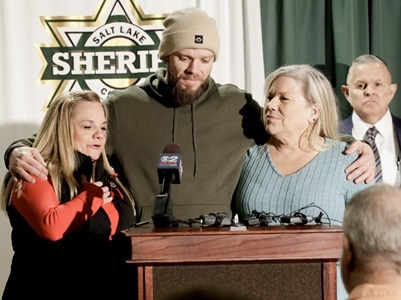
Niki Price, Jason Royter's sister; Andrew Royter, son; and Stephani Perschon, sister; during the press conference last week announcing Mark Munoz's arrest for the 2005 murder of Jason. Credit: Salt Lake County Sheriff's Office
Investigators in Salt Lake County (Utah) have arrested a suspect in the 2005 cold case murder of Jason Royter after a recent CODIS hit.
On Aug. 6, 2005, Royter, a 33-year-old father or two, was discovered deceased in his residence by his girlfriend. He had suffered multiple stab wounds, and his death was ruled a homicide. There were no signs of forced entry to Royter’s home, no apparent motive and no witnesses.
Detective Christine Petty-Brown took the lead on the case, conducting many interviews, following up on hundreds of leads, and examining every piece of evidence in 2005 as well as over the next 10 years. But the case still went cold. It was eventually turned over to cold case detective Ben Pender, who continued to work on it for the next 10 years with no leads—until one finally came.
In 2024, Mark Munoz, 53, committed a crime in a different state. As a result, police took a DNA sample from Munoz and uploaded it to CODIS—and there was a hit. Munoz’s DNA matched samples collected from Royter’s home on Aug. 6, 2005.
Pender said it took a while for police to track Munoz down after they received the CODIS hit as Munoz is homeless and leads a transient lifestyle, but they were able to finally locate and arrest him on Jan. 23, 2025.
Thus far, investigators have not been able to establish a motive.
“As of right now we don’t have a motive. Munoz was unwilling to speak to us so he knows what happened, but we don’t,” said Sheriff Rosie Rivera from the Salt Lake County Sheriff’s Office.
Rivera was unable to provide many more details as she still considers the case open and active despite Munoz’s arrest. She said police are still looking for any additional evidence that will help move the case through the criminal justice process.
“We’re putting the case out there again if anyone knows any information. I know 20 years is a long time but now that we have a name, maybe someone will think about it and say, ‘I know that individual,’” said Rivera. “If you knew Munoz, if you had any interactions with him, if you remember the day it happened—that’s what we’re asking for. Sometimes this type of arrest will trigger that [information.]”
Two of Royter’s sisters were present at the press conference, as well as his son Andrew, who was 12 at the time of Jason’s murder. Rivera and other investigators credited Royter’s family for never giving up the fight to identify Jason’s killer.
“I want you to know that we appreciate you,” Rivera told Jason’s family. “We appreciate the fact that you didn’t give up on this, that you call, you push our folks. We didn’t give up either, but it takes both sides to continue to investigate these cases.”
Brown-Petty, who worked the case from 2005 to 2015 when she was in the homicide unit, agreed.
“I want to thank the family. In the homicide unit, you work a case and then the next one comes. This family didn’t let me forget. Almost weekly calls for 10 years,” said Brown-Petty. “When I left that unit, I said to Detective Pender, ‘I’m dependent on you. You need to solve this case. Even if I’m 80 years old sitting on the porch, I expect a subpoena to come.’”